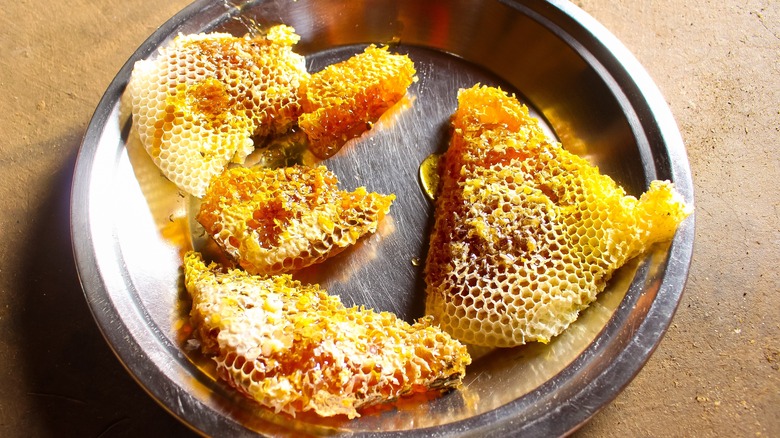The Banned Honey That Can Cause Hallucinations
Honey can do some amazing things. Not only does it have natural antibacterial and anti-inflammatory properties, it is also one of the only known foods to never expire (case in point: when archaeologists found perfectly preserved, still edible pots of the stuff inside Egyptian tombs). And, of course, it is a life-changing addition to many dishes, like honey soy marinated baked chicken thighs and honey mustard-glazed ham. So, it might surprise you to learn that there's actually a type of honey that can cause you to hallucinate, vomit — and in some cases, even die.
This is mad honey, or bitter honey as it is sometimes known. Found predominantly in Nepal and Turkey, this red-tinged varietal is laced with grayanotoxin (a toxin found in some plants that can be fatal to humans in high doses). In this case, it comes from certain species of rhododendron, an unassuming flowery shrub from which bees gather nectar to produce honey. According to Science Direct, the potential side effects of consuming grayanotoxin include salivation, emesis, hypotension, bradycardia, arrhythmias, hypotension, chest pain, dizziness, circumoral and extremity paresthesias, incoordination, and muscular weakness. And while consuming this honey is rarely lethal, it's still a toxic substance — and as such, has been banned in certain parts of the world.
Mad demand for mad honey
Mad honey's intoxicating side effects have seen people experiment with it in a recreational capacity, similar to magic mushrooms (it takes just a few teaspoons to send people into a low-key mind-altering state). Others believe this hazardous honey has profound health benefits — in Turkey, for example, it's not uncommon for men to consume it as a cure for impotence. Throughout history, mad honey has also been prescribed as an alternative medicine for everything from hypertension and diabetes to arthritis and indigestion.
Regardless of its intended use, mad honey has been made illegal in a number of countries including Canada, Mexico, Brazil, Australia, India, and South Korea. As such, it's worth big bucks on the black market (up to $80 per pound in some places).
One can't help but wonder if this price is also indicative of the extraordinary lengths people must go to in order to harvest mad honey in the first place — in Nepal, for example, honey hunters must scale dangerously high rock faces to collect it, but not before setting fires at the base to smoke the bees out. In Turkey, people have to brave bear-ridden forests to harvest the honey there. Interestingly, mad honey is still legally available to purchase in the United States.
A trippy history
The history of mad honey is almost as trippy as the substance itself. The first known account of mad honey is believed to be that of Greek historian and philosopher Xenophon, who recorded the effects in his "Anabasis" (via Cardiovascular Toxicology) after the band of soldiers he was traveling with through Turkey in 401 B.C. unwittingly consumed the toxic treat. He speaks of how they suffered from vomiting and diarrhea, along with the inability to stand, adding "...those who had eaten a little were like people exceedingly drunk, while those who had eaten a great deal seemed like crazy, or even, in some cases, dying men." He notes that it took a whole day before the soldiers came to, and another day or two after that before they could finally continue on their travels.
Another famous account of mad honey comes to us courtesy of the Persian army, who in 69 B.C. laid pots of the sticky stuff as an ambush for their Roman enemies, not far from where Xenophon's companions had their unfortunate experience, hundreds of years earlier. When the hungry Roman soldiers stumbled across these pots, they couldn't help themselves, leaving the way open for their defeat (read: death) by the Persians. Interesting as all of this is, we can't help but think it serves as a warning — perhaps mad honey is best left to the bees.


